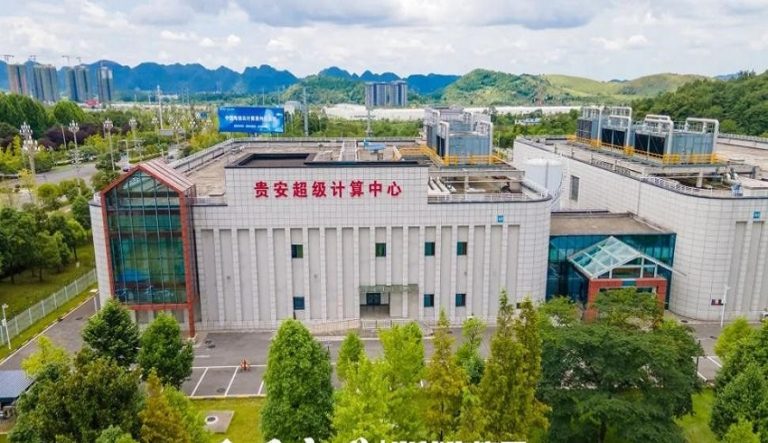
By Chen Junyi, At the Gui’an Supercomputing Center, which is located in Guiyang, southwest China’s Guizhou province, over 600 servers are running at full speed, supplying constant computing power to cities like Shenzhen, Guangzhou, and Wuhan, creating a vibrant ambiance with constant hum of cooling fans and flickering indicator lights.
As one of the eight major hubs of China’s national integrated computing power network, Guizhou is actively pursuing the integrated development of data storage and computing, with a particular focus on intelligent computing.
It aims to enhance the capacity in computing power supply, effectively match the supply and demand of computing power within the province and elsewhere, and better utilize computing power and localize the computing industry, so as to establish a support base serving the whole country.
Guizhou launched its plans to develop data centers ten years ago. It boasts numerous natural advantages for developing the computing industry, such as safe geological conditions, reliable power supply, and low average temperatures. China’s three telecommunication operators, namely China Telecom, China Mobile, and China Unicom, have all set up data centers here, making it the first province in China to host data centers of all the three.
After a decade of development, Guizhou is currently home to 47 data centers, either under construction or in operation, including 25 super-large and large data centers, most of which are located in the Gui’an New Area.
The Gui’an New Area is known for its flat terrain and an annual average temperature of 15 degrees Celsius. The region enjoys 99.5 percent of days with good air quality throughout the year, thereby serving as a natural air conditioner and oxygen bar.
The power usage effectiveness (PUE) of data centers in the region, a metric for energy efficiency, is lower than 1.2, which is at the forefront of all green data centers across the country. It is also one of the areas in China where data centers boast the lowest energy consumption and the longest equipment lifespan.
“As the carrier of computing power, data centers are equipped to support high-performance application scenarios by leveraging advanced computational capabilities and large-scale data processing power through the use of various hardware components such as servers and graphics cards,” said Peng Benqian, head of the Gui’an Supercomputing Center and director of the technology research and development department of Gui’an New Area Science and Technology Innovation Industries Development Co., Ltd., the company that runs the center.
In the past, most data centers in Guizhou were primarily focused on storage. With the rapid development of artificial intelligence (AI), Guizhou is advancing intelligent computing, which forms the basis of AI development. The data centers are rapidly transforming from mere “storage centers” to integrated “storage and computing ones.”
The Gui’an Supercomputing Center, the first of its kind in Guizhou, was put into operation at the end of 2020. “We have more than 600 servers, and the peak computing power has reached 130 petaflops,” Peng said.
“It would take nearly 600 years to create special effects rendering for a 3D animated film with a regular computer. However, the whole process can be completed within 3 months at our center,” he said.
In addition to locally built computing power centers, top internet companies such as Huawei, Tencent, and NetEase have established superlarge computing centers and intelligent computing centers in Guizhou. Besides, many banks have set up their financial data centers in the province.
Guizhou has become one of the regions in China with the strongest intelligent computing capabilities. By the end of July 2024, its computing power had reached 40.55 Eflops (a measurement unit used to determine a computer’s speed), with intelligent computing power amounting to 37.578 Eflops, accounting for over 90 percent.
Just like other commodities, computing power cannot be on a perfect supply-demand balance. Idle computing resources will enter a public computing resource pool and be scheduled by the Guizhou branch of China’s national integrated computing power network to efficiently connect the resource side and the demand side.
The transmission and trading of computing power rely on network infrastructure. Guizhou has established direct connections with 38 cities across China, including Beijing, Shanghai, Shenzhen, and Guangzhou. The computing power can meet the huge demand of the “East data, west computing” project, a key part of China’s digital infrastructure which aims to coordinate the computing capabilities of the country’s eastern regions, where the need for computing is high, with inland western regions like Guizhou, where abundant renewable resources are optimal for building data centers, according to Zhang Jie, head of the business department of Gui’an New Area Data Service Technology Co., Ltd.
Meanwhile, Guizhou is leveraging its computing power to drive industrial development and extend the industrial chain. With the support of computing power, many local companies have begun to explore new opportunities.
Guizhou Tuzhi Information Technology Co., Ltd. is a technology company specializing in geospatial big data application and development and a professional provider of real-time spatial-temporal information services integrating air, space, and ground data. With over 8 years of experience, the company has witnessed the evolution of Guizhou’s big data industry.
“The ecosystem of the big data industry in Guizhou is getting better and better, with refined computing power support, industry applications and data transactions. We have seen increasing productivity and expanding business scope,” Huang said.










